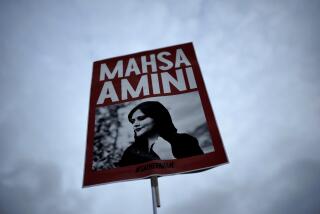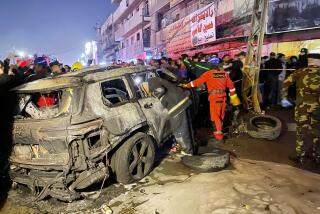Iraqi Shiite group massacred Sunnis at mosque, Human Rights Watch says
Iraq’s largest Shiite militia, which has been incorporated into the U.S.-backed national army and police, has been accused of massacring 34 Sunni Muslims at a mosque northeast of Baghdad in August.
A Human Rights Watch report issued Sunday is the latest accusation by human rights groups of atrocities against Sunnis by the Asaib Ahl al Haq militia and other Shiite armed groups, which work closely with the army and police under Iraq’s Shiite-dominated government.
The allegations are worrisome for the United States, which advises, arms and equips Iraq’s security services even as they assimilate Shiite militiamen into their ranks. Killings of Sunnis by the militias contribute to worsening sectarian bloodshed that has raised fears that Iraq is returning to the deadly Shiite-Sunni warfare of 2006 and 2007, which killed thousands of Iraqis.
The United Nations reported Saturday that the number of Iraqis killed in violent incidents in October rose to 1,273, about two-thirds of them civilians. The total did not include Iraqis killed in violence in Anbar province, much of which is controlled by Islamic State.
Sunni militants loyal to Islamic State, which has overrun nearly a third of Iraq this year, have carried out a series of massacres of Shiites, along with a car-bomb campaign that has killed hundreds of civilians every month. Islamic State fighters conducted a mass execution Saturday night of 67 people from a Sunni tribe, including women and children, near the city of Ramadi west of Baghdad, according to tribal leaders.
The Human Rights Watch report said Shiite militiamen, accompanied by men wearing police uniforms, shot and killed 34 people praying at a mosque in the village of Imam Weiss, about 70 miles northeast of Baghdad, on Aug. 22. Among the dead were a woman and a 17-year-old boy, the report said.
Witnesses told Human Rights Watch that despite a police checkpoint 150 meters from the mosque and an Iraqi Army checkpoint 200 meters away, no police or soldiers responded to the shootings, either to investigate or intervene.
“Pro-government militias are becoming emboldened and their crimes more shocking,” Joe Stork, deputy Middle East director at Human Rights Watch, said in a statement included in the report. “Iraqi authorities and Iraq’s allies alike have ignored this horrific attack and then they wonder why ... Islamic State has had such appeal among Sunni communities.”
In an interview in Baghdad last month, a spokesman for the Asaib Ahl al Haq denied reports of abductions, torture and executions of Sunnis by the militia, as alleged in previous reports by Human Rights Watch and Amnesty International. The spokesman, Naeem Aboudi, said the reports were part of a propaganda campaign by foreign groups.
A spokesman for Iraq’s Interior Ministry, which has authority over the police and affiliated militias, told Human Rights Watch that the mosque attack may have been retaliation for a car bomb earlier in the day that killed several Shiite militiamen. The spokesman, Gen. Saad Maan, called the massacre “a normal, spontaneous reaction of revenge.”
Maan said authorities had identified three suspects accused of taking part in the attack, but he provided no details.
Human Rights Watch called on the Iraqi government to investigate the killings and arrest those responsible. The group also urged the United States and other nations that support Iraq’s security services to suspend military assistance until Iraq’s Shiite-dominated government ends atrocities by the militias and security services.
The Obama administration has pressured Iraqi Prime Minister Haider Abadi, a Shiite, to share power with Sunnis, Kurds and other minorities as a condition of continued U.S. military assistance. About 1,400 U.S. military advisors are in Iraq.
The United States spent $25 billion over eight years to arm, equip and train Iraq’s security services. The army and police once battled Shiite militias, which were among the biggest killers of U.S. troops before American combat forces withdrew from Iraq in 2011. The Asaib Ahl al Haq militia claimed responsibility for more than 6,000 attacks against U.S. and coalition forces between 2006 and 2011.
Because the militias have been incorporated into Iraq’s security forces, they have access to weapons and equipment supplied by the United States. Since August, U.S. military advisors have assisted the Iraqi Army in operations against Islamic State militants in Iraq, even as the army has fought alongside Shiite militiamen.
U.S. warplanes have conducted airstrikes against Islamic State targets in support of the Iraqi Army and affiliated militias since Aug. 8. The Human Rights Report noted that Shiite militiamen have taken over some areas where the United States has carried out airstrikes.
“Iraq’s international allies cannot allow the fight against the abusive extremists of ISIS to be carte blanche for the Iraqi government’s allies to callously kill civilians who happen to be Sunni,” Stork said, using an acronym for Islamic State.
More to Read
Start your day right
Sign up for Essential California for news, features and recommendations from the L.A. Times and beyond in your inbox six days a week.
You may occasionally receive promotional content from the Los Angeles Times.







